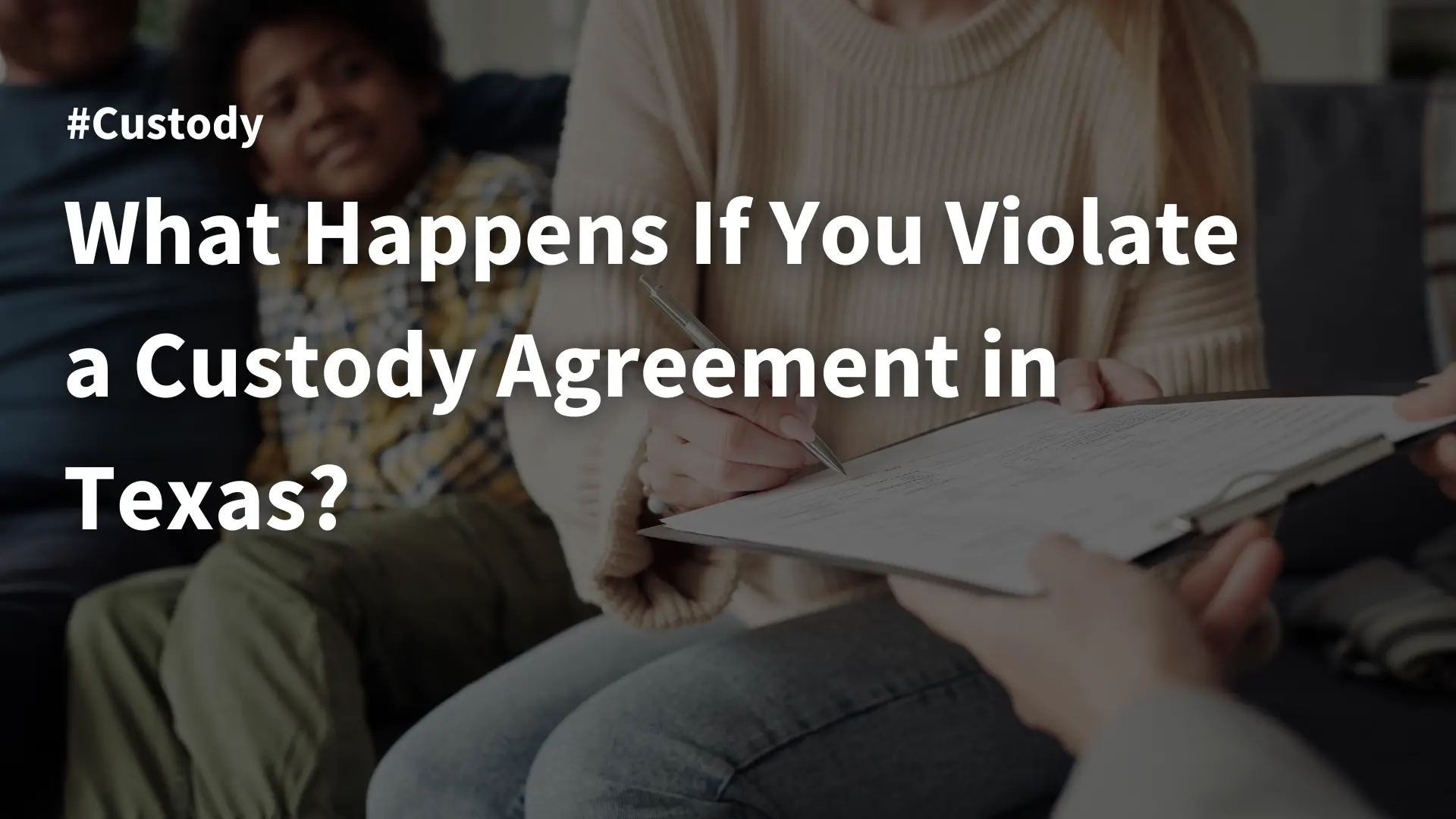Parents will often do anything for their children. However, complications can arise when they cross boundaries and go beyond the parameters of a custody agreement. Violating a custody agreement in Texas can lead to significant legal consequences, even if you believe you had a good reason.
These agreements are legally binding court orders. Failing to follow a valid agreement can disrupt your child’s routine and affect parental rights. Missing a scheduled drop-off, denying visitation, or making unauthorized decisions are deviations that can potentially trigger legal action—clear examples of violating child custody or visitation order consequences that parents should take seriously.
What happens if you violate a custody order in Texas? Learn more about the potential penalties and what to do if you’re accused of a violation—or if the other parent breaks the agreement—so you fully understand the consequences of violating a child custody or visitation order.
What Counts as a Custody Agreement Violation?
Winning custody orders are legal documents that outline each parent’s rights and responsibilities following a divorce or separation. Court-ordered custody agreements are legally binding. Violating the terms of these agreements can cause significant legal issues. How do parents know what constitutes an agreement violation, especially when they believe their actions benefit their child?
Custody agreement violations can take several forms, depending on the specifics of your unique arrangement. Some of the most common actions and behaviors that may violate a Texas custody agreement include:
Denying visitation
One of the most common violations is refusing to allow the other parent their scheduled time with the child. A custody agreement often outlines each parent’s legal right to spend time with their child. Actively preventing a child from seeing their other parent or denying the other parent their court-ordered visitation time can be a violation.
Parenting time or visitation issues
Failing to return the child at the agreed-upon time or constantly being early or late to pick-ups or drop-offs interferes with the other parent’s visitation or parenting time. Not sticking to the agreed-upon routine or schedule can constitute a custody violation.
Unauthorized travel
Taking the child out of the state or country without court permission or the other parent’s consent is a violation.
Relocating or moving
If you are moving significantly with a child, you must get the other parent’s permission or seek a custody order modification. Moving away with a child without consent can be a significant problem.
Interfering with communication
Most agreements outline how parents can communicate with their child. Blocking phone calls, texts, or restricting other forms of contact between the child and the other parent can trigger legal issues.
Making significant decisions without consent
Custody comes in two forms: legal and physical. In joint legal custody arrangements, one parent cannot unilaterally make significant medical, educational, or religious decisions without input from the other.
Failing to follow other specific conditions
Child custody arrangements may include specific provisions unique to your family’s situation. Failing to comply with the child custody order provisions can lead to legal complications.
Legal Consequences of Violating a Custody Order
Violating a custody order in Texas can lead to significant legal consequences, even for a first offense. Courts treat custody violations as a failure to comply with a legally binding court order. Depending on the severity and nature of the violation, consequences can include:
Contempt of court
A parent found in contempt for willfully violating a court order may face fines up to $500, community supervision, or jail time.
Loss or modification of custody rights
A Texas court can alter the custody or visitation arrangement if one parent consistently fails to comply.
Make-up visitation
The violating parent may be required to allow additional visitation time with the other parent.
Paying attorneys’ fees or court costs
Sometimes, the court orders one parent to pay the other parent’s attorneys’ fees and court costs.
Criminal charges
In extreme cases, such as parental abduction or when the child is endangered, criminal charges may apply.
Courts prioritize the child’s best interests and expect both parents to follow the custody order. If a parent believes a change is needed, they must go through legal channels rather than taking matters into their own hands.
Please read more about protection and no contact orders here: Protection Order vs. No Contact Order: What’s the Difference?
What to Do If the Other Parent Violates the Custody Agreement
When one parent disregards the rules, you may feel frustrated and angry. The worst thing you can do is to violate the same custody rules to get back at the other parent. You have legal options to help you get your family back on track and help ensure the other parent sticks to the court order. If the other parent violates your custody agreement, protect yourself and your child by taking these steps:
Document all violations
One late pick or infraction may be a mistake, but multiple violations are a pattern of poor behavior. Keep detailed records of every violation. Include dates, times, missed visits, text messages, emails, or anything that proves the other parent didn’t follow the agreement.
Do not retaliate
You may feel frustrated and want to take matters into your own hands. Resist the urge. Even if the other parent is violating the order, do not retaliate. Continue to uphold your custody responsibilities to show the court you are acting in good faith.
Communicate with the other parent.
If it’s safe and appropriate, try talking with the other parent to understand the reason behind the violation. Communicating your concerns and working together to find a mutually beneficial solution can help you avoid going to court.
Contact Your Attorney
A family law attorney can explain your rights, evaluate your case, and determine the next steps you should take.
File a Motion to Enforce
If violations continue, your lawyer can file a motion for enforcement with the court. A judge can order remedies like make-up time, fines, or even a modification of the custody arrangement.
Go to Court if Necessary
If nothing stops the violations, you can file a motion for contempt and take your case to court.
An Austin Child Custody Attorney Can Help
At Smith & Bledsoe Family Law in Texas, our compassionate child custody lawyers understand you are in a tough position. You want to do what’s best for your child. That can be challenging when the other parent doesn’t respect the rules. Our family law team can help you find legal solutions that protect you and your family.
Let us help you build and maintain a strong relationship with your child. Contact our office online or call (512) 277-3166 to arrange a confidential consultation.

